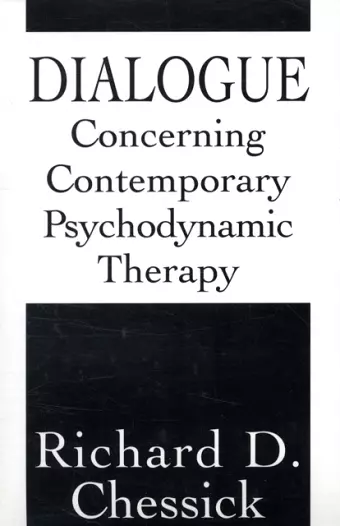Dialogue Concerning Contemporary Psychodynamic Therapy
Format:Paperback
Publisher:Jason Aronson Publishers
Published:7th Jul '77
Currently unavailable, and unfortunately no date known when it will be back

In this unique book, Dr. Richard Chessick asks questions about psychotherapy and answers them. Engaging readers in a dialogue between a senior psychodynamic clinician and novice mental health professionals, one with a particularly medical-biological approach to psychological problems, Dr. Chessick demonstrates how dynamic therapy works and explains the current controversies in the field.
Specifically, the discussion—modeled on Galileo's "Dialogues Concerning the Two Chief World Systems"—considers the significance of memories and early experiences, the therapist's input, curative factors, differentiating psychoanalysis and psychotherapy, interpretation, treatment impasse and failure, idealization and transference, borderline states, object relations theories, and the future of the field. Alternative points of view and unresolved issues are highlighted, along with many useful tips for successful clinical practice and case vignettes.
This book brings readers to the cutting edge of current thinking in the theory and practice of intensive psychodynamic psychotherapy and highlights the kinds of concerns and problems that are faced by beginning and advanced students as well as seasoned clinicians.
This involving exposition of the 'dialogue' follows the model of Galileo, who wrote in 1629 his wonderful 'Dialogue Concerning the Two Chief World Systems.' In a conversation, with himself as Psychotherapy Supervisor, Chessick poses two figures, one a more advanced student who represents the psychodynamic orientation, and the other a beginner who seems more comfortable with an organic, neurologic orientation. Using this format, the interlocutor presents the author's point of view, that is, the basic fundamentals of psychoanalytic and psychodynamic psychotherapy from a clinical rather than a theoretical perspective, and answers questions at various levels of sophistication. He also discusses current issues, differences, and approaches as they relate to his theme. The bibliography is comprehensive and very useful, especially for students and researchers. This is a valuable book for those who wish to familiarize themselves with contemporary as well as classical theory. -- George H. Pollock, MD, PhD
ISBN: 9781568213712
Dimensions: 207mm x 140mm x 15mm
Weight: 254g
177 pages